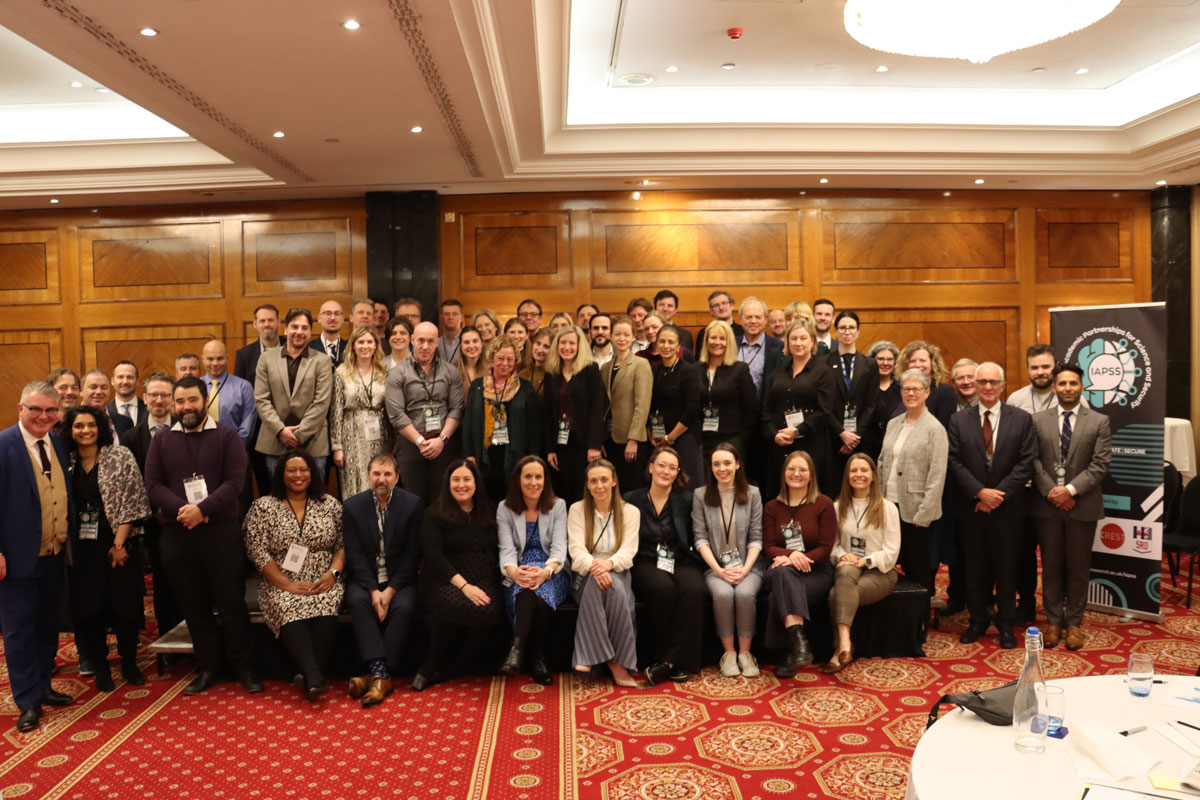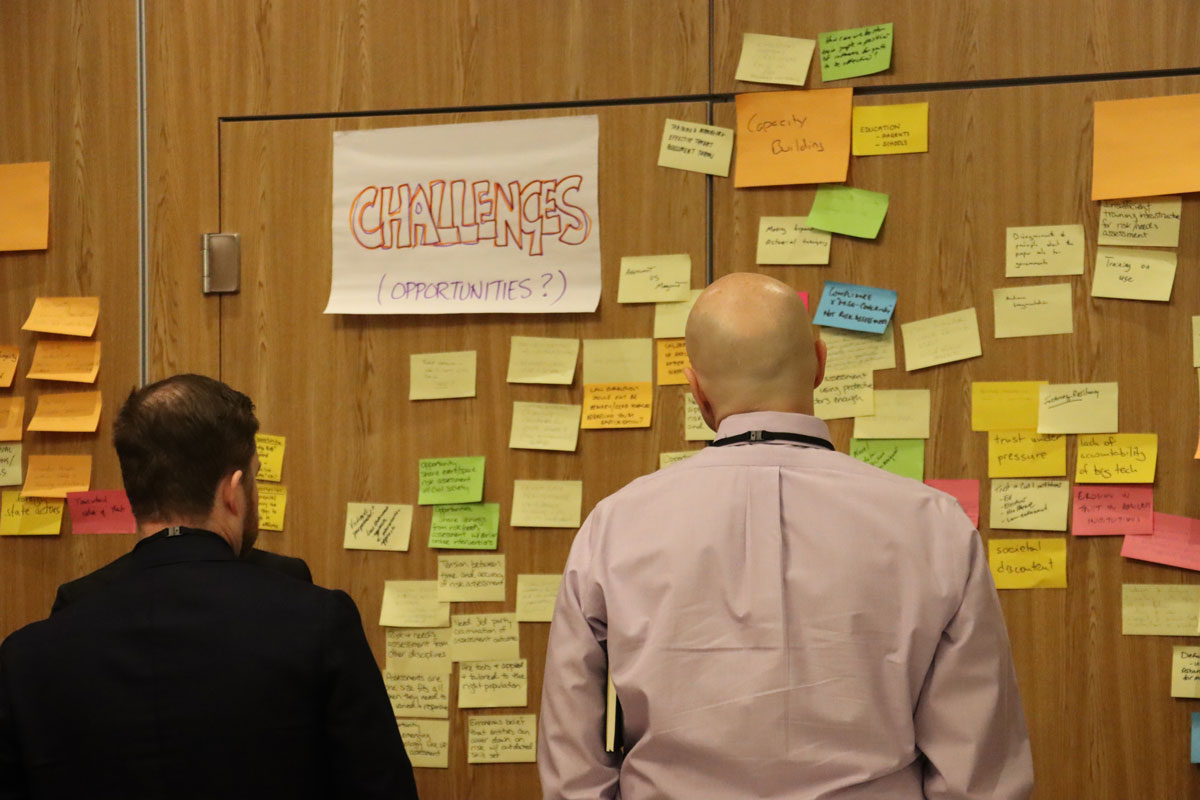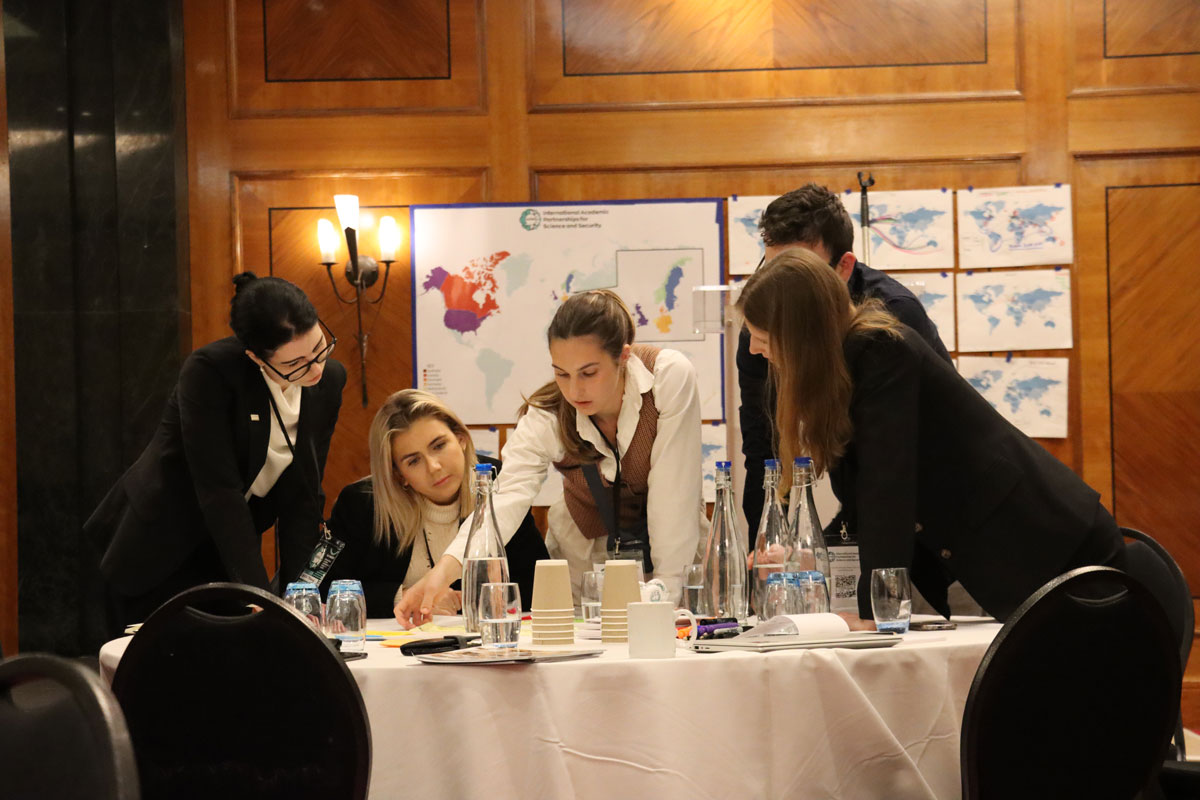'If we're going to have ambition, it should be big': NCITE and CREST Host Inaugural IAPSS Meeting in London
- published: 2024/04/02
- contact: NCITE Communications
- email: ncite@unomaha.edu
- search keywords:
- terrorism research
- science and security
- international academic partnerships

By Blake Ursch (NCITE Strategic Communications Manager)
LONDON — The researchers, all hailing from different parts of the world, walked to a wall at the back of the room, holding papers brimming with text. One by one, they taped them up, creating a patchwork of some of the world’s most pressing challenges.
They arranged these sheets in a timeline from left to right, visualizing these research priorities from short- to long-term. Perhaps unsurprisingly for anyone in this line of work, most wound up on the left.
So, it was fortunate that this hotel conference room happened to be packed with some of the world’s leading minds studying terrorism.
The exercise marked the second day of the inaugural International Academic Partnerships for Science and Security (IAPSS) conference, held March 5-6 in London. The conference drew more than 60 attendees from 17 research centers across 12 countries to answer two important questions: What problems do our nations share? And how can we work together to solve them?
This international consortium, led by the U.S.-based National Counterterrorism Innovation, Technology, and Education Center (NCITE), has seed funding for its first three years with a $2 million grant from the Department of Homeland Security’s Science and Technology Directorate (S&T), via the Office of University Programs Center of Excellence network.
Inspired by the 5 Country Research and Development (5RD) network’s collaboration on counterterrorism research, the IAPSS consortium is meant to serve the broader international research community. The network pulls in academics in allied countries to exchange knowledge and work collaboratively on problems that transcend national borders.
To do this, NCITE worked with the U.K.’s Centre for Research and Evidence on Security Threats (CREST) to hold an inaugural meeting in London. The meeting featured an international guest list of representatives involved in academic research in counterterrorism and terrorism prevention.
We’re dealing with multiple countries’ priorities ... The thing that I’ve found that ties it all together is rigorous scientific inquiry.
In opening remarks, NCITE Director Gina Ligon, Ph.D., and CREST Director Stacey Conchie, Ph.D., outlined the project’s underlying goal: To build an academic network that can help countries be proactive in preventing and responding to terrorist attacks.
“All of the countries included here today are at risk for violent extremism,” Ligon said, speaking of the U.S., U.K., the Netherlands, Australia, Canada, Germany, New Zealand, Norway, Denmark, Sweden, Switzerland, and Ireland. All were represented by an audience of academics and government practitioners.
Led by seasoned government workshop facilitator Tim Morley, attendees spent two days participating in a series of exercises designed to spark productive discussion and build relationships. They worked together in groups – regularly switching partners – discussing potential research agendas and practical objectives for IAPSS.
“We’re dealing with multiple countries’ priorities,” said Rik Legault, Ph.D., senior advisor for social and behavioral sciences to DHS. “The thing that I’ve found that ties it all together is rigorous scientific inquiry.”

Working together, the assembled teams identified several key research interests shared across borders, such as:
- Developing structures to identify and prioritize new and emerging threats
- Shared data collection and repositories
- Identification of risk and protective factors across countries and time periods
They also identified several common challenges in their work, including access to data, a lack of shared definitions among the international research community, and the difficulty in keeping pace with a rapidly changing technology landscape.
The teams emerged with several practical initiatives to move IAPSS forward in the coming years, including the development of the IAPSS website, regular meetings and webinars, and the publication of the inaugural IAPSS Review magazine.
But some of the most important initiatives to emerge from the conference center on building the next generation of terrorism scholars.
“Personally, we are really passionate about early career researcher development,” Conchie said.

The IAPSS audience included 11 early career researchers (ECRs) – scholars studying for or within 10 years of receiving their Ph.D. – from eight different countries. Their number included researchers like Lotta Rahlf of the Peace Research Institute Frankfurt (PRIF) in Germany whose research interests deal with evaluating anti-terrorism measures.
“Since I am doing a comparative study for my Ph.D., it was great to meet practitioners and policymakers from different countries – not just in the E.U., where I’m focusing on, but also beyond that – and find out which people I can connect to further my research goals,” Rahlf said.
Following recommendations from conference attendees, the IAPSS team will soon launch an Early Career Researcher Grant Program, aimed at helping ECRs collaborate and share their research internationally.
The project team has also established bursaries to help early career researchers attend conferences and other events. The program is currently accepting applications for £500 bursaries to attend Megaweek – an international conference focused on terrorism in Montreal – during the summer of 2024.
On the second day of the conference, another early career researcher, James Lewis, Ph.D., a research fellow at CREST, said he was excited for the opportunity to network with both new and experienced academics.
“The breadth of the network is amazing,” he said. “I’m really hoping it continues, and I get the opportunity to engage in this moving forward.”
It was a sentiment shared by many as the conference drew to a close.
Near the end of Day 2, Morley asked the audience to share their thoughts on the conference and their hopes for IAPSS moving forward. Tim Legrand, Ph.D., of Australia’s Social Science and Intelligence Research Network (SSiReN), took the mic.
“I feel like there’s an opportunity for IAPSS to be the peak international body for research and government collaboration on violent extremism,” he said. “If we’re going to have ambition, it should be big.”